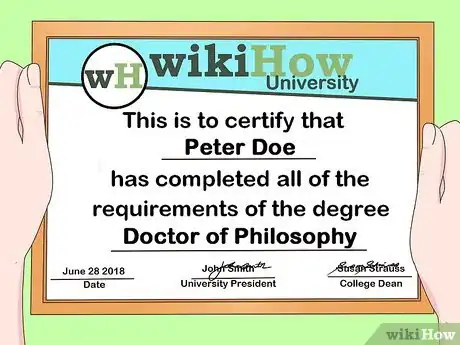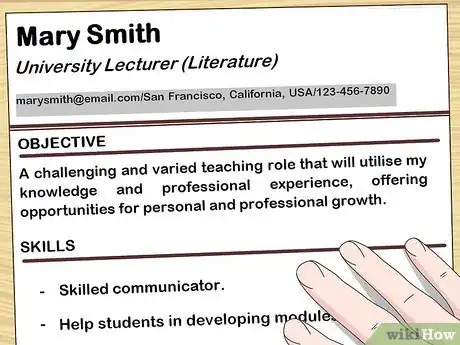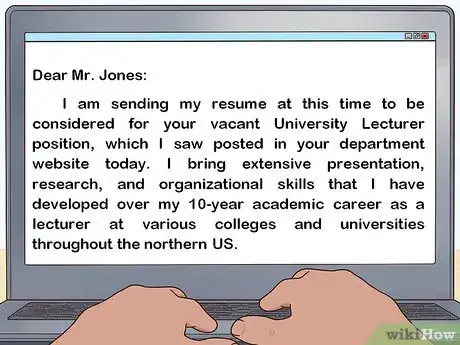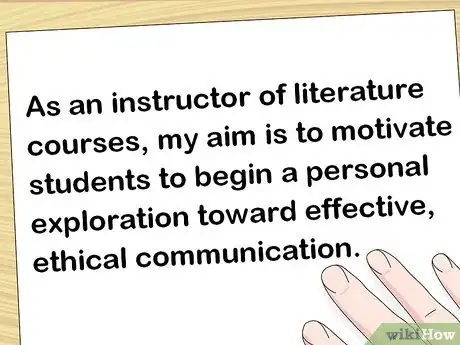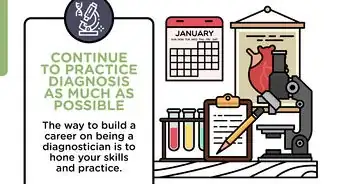This article was co-authored by Felipe Corredor. Felipe is a Senior College Admissions Consultant at American College Counselors with over seven years of experience. He specializes in helping clients from all around the world gain admission into America's top universities through private, one-on-one consulting. He helps guide clients through the entire college admissions process and perfect every aspect of their college applications. Felipe earned a Bachelor's Degree from the University of Chicago and recently received his MBA.
This article has been viewed 39,515 times.
University lecturers teach college students in a variety of academic and vocational subjects and using an assortment of different methods, including lectures, seminars, and fieldwork. As such, they have a unique opportunity to shape young people’s minds and pass on their own knowledge to the next generation. By gaining the right education and experience and submitting a strong application, you too can become a university lecturer.
Steps
Gaining the Necessary Qualifications and Experience
-
1Choose the academic field you want to work in. It takes a long time to accumulate the education and experience necessary to become a university lecturer. Choose a field to go into that you’d be comfortable working in for much of your career.[1]
- You will probably find more success in the long run by choosing a field you enjoy rather than one that you think will earn you the most money. For example, if you’re passionate about literature, it may be more worthwhile to go into that field instead of something you don’t enjoy.
-
2Earn a PhD to maximize your chances of becoming a lecturer. Although there are exceptions, most universities require their lecturers to have earned a Doctoral degree in their field of study. Having a PhD demonstrates your expertise in a subject matter and may also give you experience in both researching and teaching.[2]
- At smaller colleges and technical schools, you may be more likely to be hired as a lecturer with only a Master’s Degree. At any rate, you’ll almost certainly need to acquire education beyond the college level.
- When going into a PhD program, be prepared to be in it for the long haul. Although some PhD programs can be completed in 3 years, many others take up to 7 years.
Advertisement -
3Conduct independent research and have it published. Demonstrating a research profile, both through publishing research and articulating compelling plans for future work, is often key to getting a job as a lecturer. Research extensively during your PhD program and publish your findings in a reputable academic journal.[3]
- Aim to publish your findings in the most reputable journal in your field. For example, history PhDs should publish their work in the Journal of American History, which has one of the widest readerships among history journals.
- If you go into a postdoc before becoming a lecturer after finishing graduate school, consider publishing your dissertation as a book.
-
4Take advantage of opportunities to acquire teaching experience. Because teaching is such a central aspect of the job of a university lecturers, teaching skills are highly valued among job applicants. Seize opportunities to gain teaching experience when they emerge and use the experience to add to your resume.[4]
- For example, if your university has a night school, see if you can teach a course in your field while you’re still working on your PhD.
- Although it’s less valuable than college teaching experience, teaching at the high school level may also be useful for garnering teaching experience.
Applying for a Job as a Lecturer
-
1Look for openings on academic job listing websites. Universities typically post openings for lecturer positions on listservs and websites that specialize in academic jobs. Browse these sites on a regular basis and be on the lookout for jobs you might be able to apply for.[5]
- Some of the more popular sites used by academics and universities include H-Net and HigherEdJobs.
- You should browse these postings at least twice a week if you’re actively looking for jobs to apply for.
-
2Craft a CV that emphasizes your work experience, education, and skills. Your curriculum vitae (CV) operates as your resume for academic jobs, showcasing the qualities and experience that make you eligible for working at a university. To make your application as strong as possible, order your CV so that your work experience, education, and skills are emphasized.
- More specifically, your relevant work experience should be the first thing job reviewers read after your personal details, followed by your education and skills that are relevant to the position you’re applying for.
- Be sure to only include information that is relevant to the position. Don’t include skills or experience that wouldn’t obviously be useful in the job you’re applying for.
-
3Tailor your cover letter to the position you’re applying for. Your cover letter is one of the most important parts of your job application; it allows you to expand on why you’re the best person for the job. Thus, make sure the content of your cover letter is designed around the specific job you’re applying for and does not come across as generic.
- For example, if the job listing you’re responding to described specific classes that the university wants you to teach, describe any prior experience you have in that specific subject matter and/or how you would go about organizing your class.
-
4Include your teaching philosophy in your personal statement. Some universities may have you write a personal statement in addition to your cover letter. Take this opportunity to expound on your teaching philosophy, experience, and skills and showcase what makes you a better potential university lecturer than other applicants.
- For example, you may discuss cutting edge pedagogical techniques you employ (or would like to employ) in your classes.
- Note that you should NOT do this if the job listing specifies a particular topic you should address in your personal statement.
-
5Ask your professors to serve as references. You’ll need at least 2 references, and oftentimes 3, when submitting an application for a job as a university lecturer. Your references should be professors or lecturers themselves who know your research and teaching experience and can describe your qualifications in detail.[6]
- If you had a primary advisor during your PhD program, this person will probably be one of the best people to ask to be a reference for you.
- Ask any professors in your department who are widely known and respected in their field to serve as a reference. Their reputation will add a lot of weight to their description of you.
-
6Prepare for likely questions in your interview. The interview for academic jobs is mainly to gauge whether or not you know the material you’re being asked to teach. Thus, the questions you’re likely to be asked are relatively easy to predict.[7]
- For example, you can look at what other members of the department research and how their work might intersect with your own to gauge what areas of your research they will most likely ask you about.
- Look closely at the job description and note any skills or experience that it highlights. You can expect to be asked about how your own skills and experience line up with those sought after in the ideal job applicant.
References
- ↑ https://www.theguardian.com/education/2000/nov/28/furthereducation.theguardian6
- ↑ http://www.applydirect.com.au/Blog/university-lecturer-job-description
- ↑ https://blogs.ucl.ac.uk/ucl-researchers/2015/01/12/how-to-become-a-lecturer/
- ↑ https://blogs.ucl.ac.uk/ucl-researchers/2015/01/12/how-to-become-a-lecturer/
- ↑ https://career.berkeley.edu/PhDs/PhDJobs
- ↑ https://www.jobs.ac.uk/careers-advice/working-in-higher-education/2006/making-the-most-of-academic-references
- ↑ https://www.theguardian.com/higher-education-network/blog/2014/feb/07/prepare-academic-interviews-top-tips

